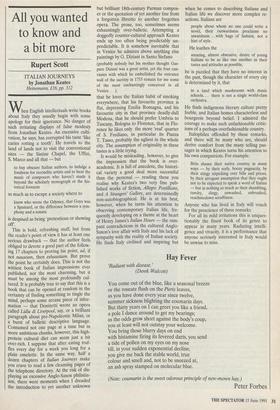All you wanted to know and a bit more
Rupert Scott
ITALIAN JOURNEYS by Jonathan Keates Heinemann, £16, pp. 312
hen English intellectuals write books about Italy they usually begin with some apology for their ignorance. No danger of such irritating displays of false modesty from Jonathan Keates. An excessive culti- vation, he says, has corrupted his taste 'like caries rotting a tooth'. He travels to the land of lands not to visit the conventional sites — the Sistine Chapel, the Uffizi, S. Marco and all that — but
to buy obscure Italian authors, to indulge a fondness for recondite artists and to hear the music of composers who haven't made it beyond the scholarly monograph or the his- torical footnote
as much as to escape a society where to
know who wrote the Odyssey, that Goya was a Spaniard, or the difference between a sym- phony and a sonata
is despised as being 'pretentious or showing off.
This is bold, refreshing stuff, but from the reader's point of view it has at least one serious drawback — that the author feels obliged to devote a good part of the follow- ing 17 chapters to proving his point, ad, if not nauseam, then exhaustiam. But prove the point he certainly does. This is not the wittiest book of Italian impressions ever published, nor the most charming, but it must be among the most profoundly cul- tured. It is probably true to say that this is a book that can be opened at random in the certainty of finding something to tingle the mind, perhaps some arcane piece of infor- mation — that Donizetti wrote an opera called Lidia di Liverpool, say, or a brilliant paragraph about pre-Napoleonic Milan, or a burst of balletic descriptive language. Consumed not one page at a time but in more ambitious chunks, however, this high- protein cultural diet can seem just a bit over-rich. I suppose that after eating truf- fles every day for a week you long for a plain omelette. In the same way, half a dozen chapters of Italian Journeys make You crave to read a few cleansing pages of the telephone directory. At the risk of dis- playing an excessive Anglo-Saxon philistin- ism, there were moments when I dreaded the introduction to yet another unknown
but brilliant 18th-century Parman compos- er or the quotation of yet another line from a forgotten libretto to another forgotten opera. The prose, too, sometimes seems exhaustingly over-balletic. Attempting a doggedly counter-cultural approach Keates ends up too often being predictably un- predictable. It is somehow inevitable that in Venice he admires above anything else paintings by G. Diziani in Santo Stefano
(probably nobody but his mother thought Gas- pare Diziani was a great artist, yet the four can- vasses with which he embellished the entrance wall of the sacristy in 1733 remain for me some of the most enchantingly conceived in all Venice. . . ),
that he loves the Italian habit of smoking everywhere, that his favourite province is flat, depressing Emilia Romagna, and his favourite city in that province deadly-dull Modena, that he should prefer Umbria to Tuscany, Bologna to Florence, that in Flo- rence he likes only the more 'real' quarter of S. Frediano, in particular its Piazza T. Tasso, probably the ugliest in the whole city. The assumption of originality in these tastes is a little trying.
It would be misleading, however, to give the impression that the book is over- academic. It is full of anecdote, the histori- cal variety a good deal more successful than the personal — reading these you realise why Keates's two very fine pub- lished works of fiction, Allegro Postillions, and A Strangers' Gallery, are determinedly non-autobiographical. He is at his best, however, when he turns his attention to observing contemporary Italian life, fre- quently developing on a theme at the heart of Henry James's Italian Hours — the ram- pant contradictions in the cultured Anglo- Saxon's love affair with Italy and his lack of sympathy with the reality of Italian society. He finds Italy civilised and inspiring but
when he comes to describing Italians and Italian life we discover more complex re- actions. Italians are
people about whom no one could write a novel, their outwardness proclaims no inwardness. . . with bags of fashion, not a hint of style.
He loathes the
amazing, almost obsessive, desire of young Italians to be as like one another in their tastes and attitudes as possible,
he is puzzled that they have no interest in the past, though the character of every city is determined by it, that
in a land which mushrooms with music schools.., there is not a single world-class orchestra.
He finds indigenous literary culture pretty feeble, and Italian homes characterless and bourgeois beyond belief. I admired the courage to make such unfashionable critic- isms of a perhaps overfashionable country.
Italophiles offended by these remarks, and there will be many who are, should derive comfort from the many telling pas- sages in which Keates turns his attention to his own compatriots. For example:
Brits shame their native country in many ways — by their surly, boozy pugnacity, by their stingy nitpicking over bills and prices, by their arrogant assumption that they ought not to be expected to speak a word of Italian — but in nothing so much as their shambling, tawdry, dingy, unwashed, unbrushed, reachmedown scruffiness.
Anyone who has lived in Italy will vouch for the prescience of these remarks.
For all its mild irritations this is unques- tionably the finest book of its genre to appear in many years. Radiating intelli- gence and vivacity, it is a performance that anyone seriously interested in Italy would be unwise to miss.


















































 Previous page
Previous page